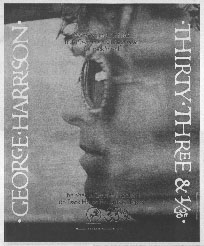![]()
  |

Thirty-Three & 1/3
George Harrison
Dark Horse DH 3005
Released: December 1976
Chart Peak: #11
Weeks Charted: 21
Certified Gold: 1/19/77
 The most accessible tracks on Thirty-Three & 1/3 are "Woman Don't You Cry for Me" and "This Song," the latter an attempt to make light of George Harrison's recent plagiarism case. To the extent that he includes these fast, cheerful numbers, and smiley oddities such as Cole Porter's "True Love" and the impenetrable fable "Crackerbox Palace," Harrison seems hoping to achieve fresh popularity. In pursuit of the commercial, the sitar is banished and replaced by a horn section. But Harrison's concept of the popular also leads him to use Tom Scott as an "assistant" in producing the album, and the overall sound of Thirty-Three & 1/3 hums with Scott's presence: it is music with the feeling and sincerity of cellophane.
The most accessible tracks on Thirty-Three & 1/3 are "Woman Don't You Cry for Me" and "This Song," the latter an attempt to make light of George Harrison's recent plagiarism case. To the extent that he includes these fast, cheerful numbers, and smiley oddities such as Cole Porter's "True Love" and the impenetrable fable "Crackerbox Palace," Harrison seems hoping to achieve fresh popularity. In pursuit of the commercial, the sitar is banished and replaced by a horn section. But Harrison's concept of the popular also leads him to use Tom Scott as an "assistant" in producing the album, and the overall sound of Thirty-Three & 1/3 hums with Scott's presence: it is music with the feeling and sincerity of cellophane.
 Click image for larger view. |
- Ken Tucker, Rolling Stone, 1-13-77.
Bonus Reviews!Sorry, Beatles fans, but Thirty Three and 1/3 is not the triumphant George Harrison comeback you've all been waiting for. True, it's better than anything he's done in ages, but for largely negative reasons -- Tom Scott's horns are almost inaudible, mentions of George's love for Krishna are held to a minimum (the Lord's in there a bit, but He's nonsectarian), a few of the songs have melodies, things like that. I have to admit, though, that I was sucker enough to have expected better. Granted, Dark Horse and Extra Texture, his two previous efforts, were perhaps the worst albums ever made by a musician with a major reputation, but George, as glimpsed recently on NBC's Saturday Night in performance with Paul Simon, and in two hilarious Eric Idle-directed promo films, both looked and sounded swell. Unfortunately, the two songs he premiered in the films provide the album's only worthwhile moments; "This Song" is reasonably clever and actually rocks a bit, and "Crackerbox Palace" is an addictive bit of Beatlesque whimsey that has some sensational guitar playing and an arrangement so alive that I find it hard to believe that the backing is provided by the usual hacks -- Willie Weeks and company -- who have made George and a slew of other famous artists sound exactly alike in the last year or two.
The most telling comment about George's other concurrent release, The Best of George Harrison, is that while John and Ringo's greatest hits collections did not contain any material from their Beatles days, George's does -- an entire side, in fact. That says more than enough about the declining state of George's creative powers.
- Steve Simels, Stereo Review, 3/77.
This isn't as worldly as George wants you to think -- or as he thinks himself, for all I know -- but it ain't fulla shit either. "Crackerbox Palace" is the best thing he's written since "Here Comes the Sun" (not counting "Deep Blue," hidden away on the B-side of "Bangla-Desh," or -- naughty, naughty -- "My Sweet Lord"), and if "This Song" were on side two I might actually play the record again. B-
- Robert Christgau, Christgau's Record Guide, 1981.
Having suffered the humiliation of being sued successfully over "My Sweet Lord," Harrison turned the ordeal into music, writing "This Song," a Top 25 hit. Even better was "Crackerbox Palace," which would have fit in nicely on any Beatles album. The rest was slight, although Harrison covering Cole Porter's "True Love" is an interesting idea. This was Harrison's first album on his Dark Horse custom label, formed after the completion of his contract with EMI/Capitol in June 1976 and initially distributed by A&M. * * * *
- William Ruhlmann, The All-Music Guide to Rock, 1995.
![]() Reader's Comments
Reader's Comments
No comments so far, be the first to comment.

